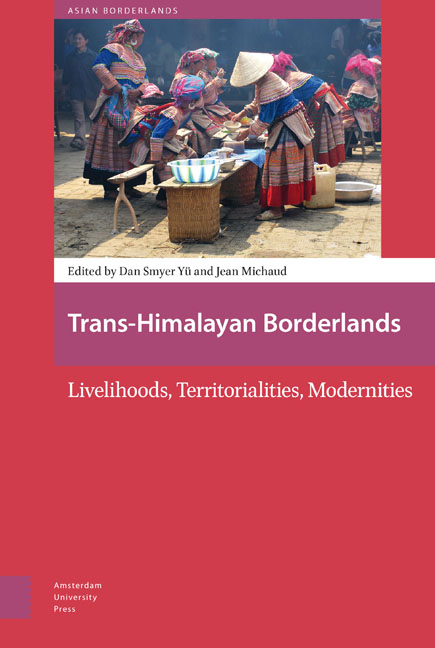Book contents
- Frontmatter
- Contents
- Acknowledgements
- Introduction: Trans-Himalayas as Multistate Margins
- I Territory, Worldviews, and Power Through Time
- 1 Adjusting Livelihood Structure in the Southeast Asian Massif
- 2 The Properties of Territory in Nepal’s State of Transformation
- 3 Trans-Himalayan Buddhist Secularities: Sino-Indian Geopolitics of Territoriality in Indo-Tibetan Interface
- 4 Buddhist Books on Trans-Himalayan Pathways: Materials and Technologies Connecting People and Ecological Environments in a Transnational Landscape
- 5 Seeking China's Back Door: On English Handkerchiefs and Global Local Markets in the Early Nineteenth Century
- II Livelihood Reconstructions, Flows, and Trans-Himalayan Modernities
- 6 Contested Modernities: Place, Subjectivity, and Himalayan Dam Infrastructures
- 7 Plurality and Plasticity of Everyday Humanitarianism in the Karen Conflict
- 8 Being Modern: Livelihood Reconstruction among Land-lost Peasants in Chenggong (Kunming)
- 9 Tibetan Wine Production, Taste of Place, and Regional Niche Identities in Shangri-La, China
- 10 Tea and Merit: Landscape Making in the Ritual Lives of the De’ang People in Western Yunnan
- 11 In-between Poppy and Rubber Fields: Experimenting a Transborder Livelihood among the Akha in the Northwestern Frontier of Laos
- 12 A Fortuitous Frontier Opportunity: Cardamom Livelihoods in the Sino-Vietnamese Borderlands
- Conclusion: Frictions in Trans-Himalayan Studies
- Index
3 - Trans-Himalayan Buddhist Secularities: Sino-Indian Geopolitics of Territoriality in Indo-Tibetan Interface
Published online by Cambridge University Press: 12 December 2020
- Frontmatter
- Contents
- Acknowledgements
- Introduction: Trans-Himalayas as Multistate Margins
- I Territory, Worldviews, and Power Through Time
- 1 Adjusting Livelihood Structure in the Southeast Asian Massif
- 2 The Properties of Territory in Nepal’s State of Transformation
- 3 Trans-Himalayan Buddhist Secularities: Sino-Indian Geopolitics of Territoriality in Indo-Tibetan Interface
- 4 Buddhist Books on Trans-Himalayan Pathways: Materials and Technologies Connecting People and Ecological Environments in a Transnational Landscape
- 5 Seeking China's Back Door: On English Handkerchiefs and Global Local Markets in the Early Nineteenth Century
- II Livelihood Reconstructions, Flows, and Trans-Himalayan Modernities
- 6 Contested Modernities: Place, Subjectivity, and Himalayan Dam Infrastructures
- 7 Plurality and Plasticity of Everyday Humanitarianism in the Karen Conflict
- 8 Being Modern: Livelihood Reconstruction among Land-lost Peasants in Chenggong (Kunming)
- 9 Tibetan Wine Production, Taste of Place, and Regional Niche Identities in Shangri-La, China
- 10 Tea and Merit: Landscape Making in the Ritual Lives of the De’ang People in Western Yunnan
- 11 In-between Poppy and Rubber Fields: Experimenting a Transborder Livelihood among the Akha in the Northwestern Frontier of Laos
- 12 A Fortuitous Frontier Opportunity: Cardamom Livelihoods in the Sino-Vietnamese Borderlands
- Conclusion: Frictions in Trans-Himalayan Studies
- Index
Summary
Abstract
This chapter is concerned with trans-Himalayan Buddhist secularities as a parallel development of state-sanctioned secularisms and as an integral part of Buddhist modernism in India and among Tibetans in the diaspora. It inquires into how the differently expressed Buddhist secularities in these two constituencies are engaged in the geopolitics of Tibet in relation to China. Situated in this transregional context, the author makes two arguments. First, Tibetan Buddhism in the last half a century has been a moving matter in the trans-Himalayan flows of people, ideas, and interregional politics. Its secular engagements and their outcomes are now affecting the ways how Tibetans and non-Tibetans project the future status of Tibet. Second, secularism and secularity are two sets of divergent practices and yet both dialectically lodge in one another. In such unique entanglement, the trans-Himalayan Buddhist secularities in essence are projects of both Buddhists and geopoliticians.
Keywords: secularism, secularity, Tibet card, Sino-Indian geopolitics, Indo-Tibetan interface
The history of Buddhist studies in the Himalayas is often traced back to Brian Houghton Hodgson (1801-1894), an officer of the British East India Company stationed in Nepal exploring the trade routes to China through Tibet (Waterhouse 2004: 7). His fine collection of Buddhist texts contributed to the establishment of Buddhology in the West by pioneering figures like Max Müller and Nathaniel Wallich (Lopez 2004: 49-51). Toward the end of the nineteenth century while European Buddhologists were indulging themselves in the textual and historical studies of Buddhism, native Buddhists in these regions rather began to link their traditional doctrinal teachings to pan-Asian Buddhist political actions. For instance, the birth of the Calcutta-based Maha Bodhi Society founded by Anagarika Dharmapala in 1891 attested to this transregional trend of modern Buddhist practices. It later spawned a variety of the socially engaged Buddhisms throughout Asia and the rest of the world, and compelled contemporary scholars to rethink Buddhist practices in the framework of Buddhist modernism, which is understood as a product of Western colonialism, industrialization, and modernization as well as of Asian Buddhists’ agentive responses to these forceful changes of our modern times (McMahan 2008: 5).
This chapter is a study of trans-Himalayan Buddhist secularities as a parallel development of state-sanctioned secularisms and Buddhist modernism in contemporary India and among Tibetans in diaspora.
- Type
- Chapter
- Information
- Trans-Himalayan BorderlandsLivelihoods, Territorialities, Modernities, pp. 85 - 104Publisher: Amsterdam University PressPrint publication year: 2017



